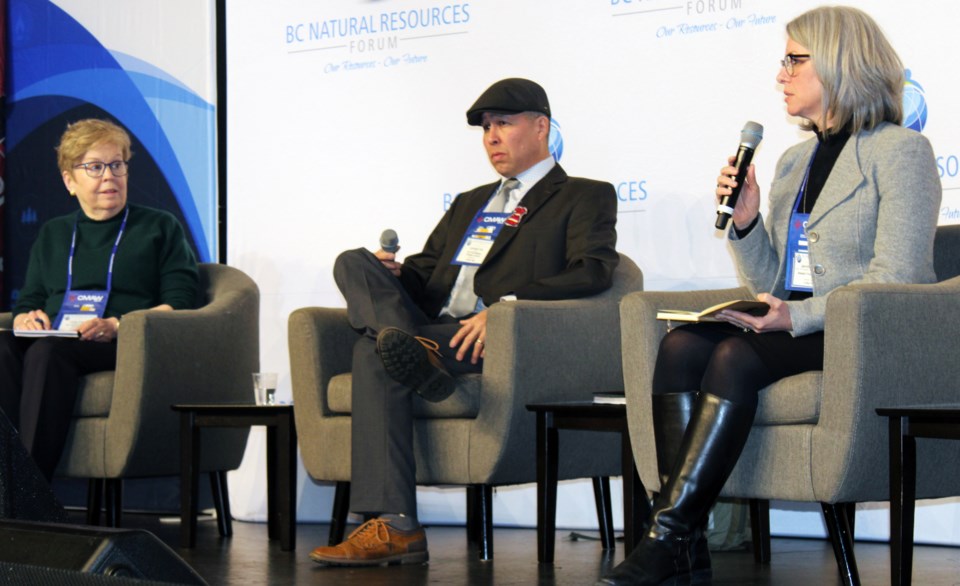How do we attract young people to the forest industry?
The question of how to attract new talent was put to a panel of forestry professionals gathered on the Prince George Civic Cand Conference Centre stage Wednesday at the BC Natural Resources Forum.
“It’s not just a challenge for this industry, it’s across the board,” said Suzanne Gill, president/CEO of Genome BC.
“I think right now in the resource sector and in forestry there’s a huge appetite in our younger generation around social justice, around protecting the environment, and we should harness that for good.”
The Vancouver based not-for-profit organization Gill works for conducts genetic research to create more disease-resistant, climate-adaptable trees.
“So all of the work we do at Genome BC with industry generally has not only better data and information around what‘s going on at a molecular level but is also thinking about putting it into practice at scale and what could it do for public good,” said Gill. “Does it help companies create new products, create new industries, and I think right now that is an interest of the younger generation and the people who are in our post-secondary schools and our colleges and technical programs and I think that’s the beauty right now of being in this environment.”
Lennard Joe, CEO of the B.C. First Nations Forestry Council and a registered professional forester who works as general manager of Merritt-based Stuwix Resources, says it’s not all doom and gloom in the forestry sector. With an aging workforce, job prospects now and in the future are healthy.
“First Nations Forestry Council is actually tackling this as one of our key priorities and our goal right now is 2,200 students or workers into the forest sector by 2027 and this comes from the province probably three years ago when it said we need 4,400 new workers in the forest sector just to maintain what we have right now, said Joe.
“You’re looking at a 15-year-old today to be that 25-year-old worker who has some certainty of security in a career in 10 years. So that’s what we need to do today is start to work on young people in order to have a future for ourselves.”
Joe, a member of the Shackan Indian Band, says employment can be created if forest companies look for ways to adapt to changing conditions and are willing to innovate. He sees that happening in Merritt.
“We have the same problems in the south as you have here in Prince George – you’ve got a baseball-size of (fibre) volume available and a soccer ball size of employment, machines and mills, so how do you make that work and create opportunities?” said Lennard.
“In Merritt, we brought our elders out to the land and they saw the debris piles and said no, that’s not acceptable. Use that fibre. So we started grinding it for co-gen (to produce electricity and heat) and we started utilizing top logs for the post/rail plant and their manpower of 23 employees.”
Western Forest Products vice-president of human resources and corporate affairs Jennifer Foster says the problem of recruiting skilled tradespeople to operate the company’s eight sawmills is one of her most troubling concerns. Compounding the problem is the skyrocketing cost of living increases over the past two years which have made it more difficult to attract workers to Vancouver Island, where the company operates.
“We’re struggling in some areas to be able to have the talent in the short term to have the talent in the short term to run operations optimally and I think that’s a problem not unique to Western,” said Foster.
“To get young people into the sector I think we have to promote the technology and the technological jobs that are available and, as well, really tell a better story as an industry in partnership with our communities, with government and our labour partners around the great careers that are available in forestry.”
The panel also discussed stumpage and the high costs of forest company operations in B.C. compared to other jurisdictions and how to utilize technology when conducting forest surveys to reduce production costs.
Panel moderator Linda Coady, president/CEO of the B.C. Council of Forest Industries, said one of the younger members of her staff suggested there could be a $20 per square-metre reduction in planning costs if artificial intelligence was used to determine the timber permitting process. The downfall is it’s expensive to introduce A.I. and that’s where investment and more certainty in the industry is needed, she said.
“We’re at a pivotal time, we’ve got changes happening in markets in terms of prices, but more than just a cyclical downturn,” said Coady. “We’ve got cost issues here in B.C., we’ve got issues around accessing economic fibre and we’ve got skill shortages, so it’s kind of like the industry is facing a triple-whammy.
“Obviously, the focus has to be on reducing the uncertainty that’s out there, particularly around fibre supply. It’s partly the nature of our terrain, the type of forests we have, there’s higher transportation costs associated with it, and we want to pay our people well and we want to have high environmental standards. But I think you heard on the panel today that there’s new technologies you can use to bring down some of those costs and we need a greater focus in what we can do to make a difference there.”


.png;w=120;h=80;mode=crop)
